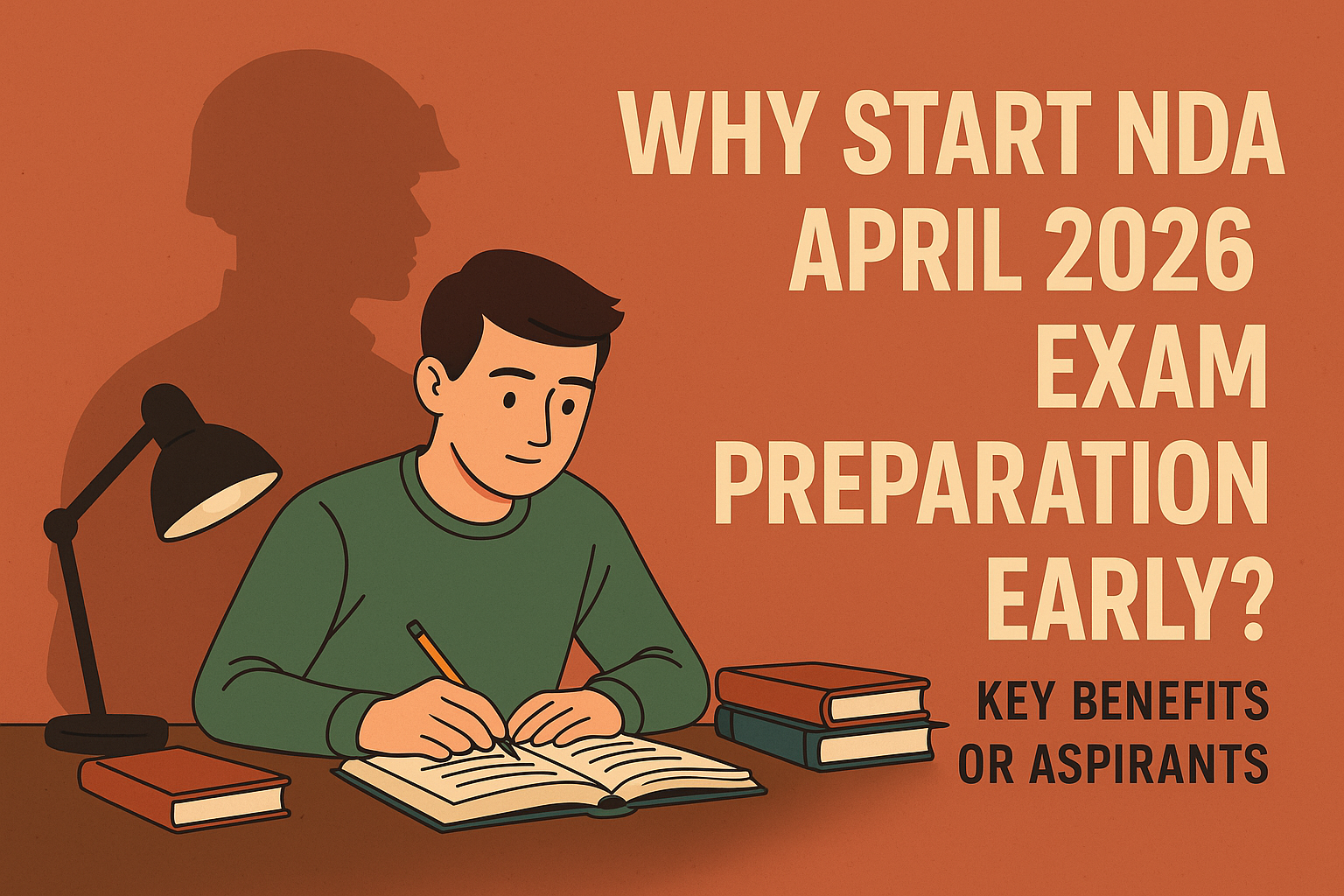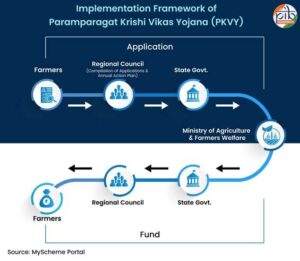Start now (or as early as possible). Early preparation multiplies your chances of clearing the NDA written exam and the SSB — because NDA success is not just raw knowledge; it’s steady practice, smart revision, and confident personality development.
Why “early” matters — 10 practical benefits
Deep conceptual clarity (no cramming):
Mathematics and science topics need layered understanding. Starting early gives you time to learn why formulas work — not just memorize them — so you can solve novel, high-pressure questions.More time for error cycles:
Learning = attempt → fail → analyze → correct. Every cycle improves accuracy. Early starters get many such cycles; last-minute starters get panic.Consistent mock-test practice (faster exam temperament):
Mock tests improve speed, time management and exam temperament. With time you can run multiple full series, review each test, and reduce negative-marking losses.Planned, spaced revision:
Spaced repetition (revisiting topics at increasing intervals) dramatically increases retention — only possible with an extended timetable.Balanced focus on GAT + English:
Many aspirants over-invest in Maths and under-prepare GAT/English. Early prep lets you allocate proper time to both — critical because GAT carries 600 marks.SSB & personality development:
SSB isn’t an afterthought. Early starters can work on communication, leadership, group tasks, and confidence through role-plays, mock interviews, and group practice — turning written-test qualifiers into final-selectees.Fitness & medical standards:
Physical preparedness (running, endurance, eyesight thresholds) takes months. Early physical training avoids last-minute injuries and improves stamina for SSB tasks.Stress control & better mental health:
Slower, planned progress reduces anxiety and improves sleep and focus — performance multipliers on exam day.Time to fix academic gaps (boards + NDA):
If you’re in Class 12 or college, starting early allows you to balance board/college commitments while prepping for NDA without burning out.Room for personalization & coaching:
Early starters can choose the best coaching option, get personal doubt sessions, and truly benefit from mentorship rather than just attend classes.
Who should start early?
Class 12 students (appearing or passed) who want to balance boards + NDA.
College students or working aspirants who need flexible, sustained planning.
Anyone aiming for a high rank and a strong SSB performance (not just “clear the written”).
How “early” is early for April 2026?
If you’re reading this around September 2025, you have about 6–7 months until April 2026 — that’s enough for a focused, high-quality plan if you start immediately. Ideal longer-term prep is 9–12 months, but an accelerated, disciplined 6–7 month plan is realistic with daily structure, mocks, and revision.
Sample accelerated roadmap (6–7 months to April 2026)
Phase 1 — Foundation (Weeks 1–8)
Maths: cover core NCERT topics + 1 standard reference per topic.
English: daily reading + grammar practice.
GK: daily current affairs + basic science/geo/history review.
Fitness: start conditioning (running, pushups, basic PT).
Phase 2 — Consolidation (Weeks 9–16)
Start sectional mock tests (2 per week).
Target weak topics; build short revision notes.
Begin group discussion and communication practice.
Phase 3 — Exam Simulation (Weeks 17–22)
Full-length UPSC-pattern mocks every week under timed conditions.
Detailed error analysis after each mock.
SSB basics: Mock interview, group tasks, psych tests.
Phase 4 — Final Polish (Last 3–4 weeks)
Revision of short notes & formula sheet.
Final 2-week mock test tapering to keep peak performance.
Medical checklist & document readiness.
Focus on sleep, diet, and confidence building.
Daily/Weekly micro plan (example for working students — 4 hours/day)
60–90 min — Maths practice (problem sets + revision).
45 min — English (comprehension + grammar + vocab).
45–60 min — GAT (science/history/geography/current affairs).
30 min — Mock-type questions / quick quizzes.
30 min — Fitness (run, core, mobility).
Weekly — 1 full mock on weekend + SSB skill session.
Mistakes early starters must avoid
Learning without testing. (Mocks are essential.)
Ignoring analysis — take actionable notes from each mock.
Overloading one subject and abandoning others.
Underestimating SSB — early personal development practice matters.
Why choose structured coaching (Victor Growth Coaching) when starting early?
Starting early plus the right coaching is a force multiplier. Victor Growth Coaching offers:
Structured long-term programs (ideal for 6–12 month plans).
Comprehensive test series that simulate UPSC style and negative marking.
SSB training labs (GTO tasks, psych test prep, interview mocks).
Personalized mentorship: doubt solving, topic-wise remedial classes.
Physical training & medical readiness focus.
Printed study materials & short-note booklets for accelerated revision.
Flexible batches (weekday, weekend, online & recorded sessions) to suit board/college schedules.
Affordable fee structure to make quality coaching accessible.
If you want to convert early effort into consistent progress and final selection, Victor Growth helps you plan, practice, and polish — written test to SSB and medical fitness.
FAQs
Q1: Is it too late to start now for April 2026?
No — if you commit to a disciplined 6–7 month plan with regular mocks and revision, you can be exam-ready. Start immediately.
Q2: How many mock tests should I attempt?
Aim for at least 1 full mock per week during consolidation, increasing to 2 if time allows. Analyze every mock.
Q3: How much time should Class 12 students devote daily?
4–6 hours/day is ideal if you balance boards + NDA, with focused weekend full mocks.
Q4: When to begin SSB practice?
Start SSB skill practice as soon as you clear the written or while preparing — basics (communication, group tasks) should be developed early.
Q5: Can self-study work for April 2026?
Yes, but structured coaching speeds up concept clarity, provides mock discipline, and gives SSB practice — especially helpful for early starters.
Q6: How important is physical training?
Very — SSB tasks and medical fitness require stamina and endurance. Start PT early to avoid injury and build endurance.
Q7: Should I focus more on Maths or GAT?
Both matter. Allocate more time to Maths early for concept mastery, but don’t neglect GAT — it’s 600 marks.
Q8: What if I’m weak in one topic?
Use early months to remediate weak areas with targeted sessions and additional practice. Coaching helps identify and fix gaps quickly.
Q9: Will Victor Growth Coaching help with SSB?
Yes — Victor Growth provides SSB mock sessions, GTO practice, personality development and interview coaching.
Q10: How to stay motivated long-term?
Set weekly targets, track progress with mocks, celebrate small wins, and stay connected with mentors/peers.






